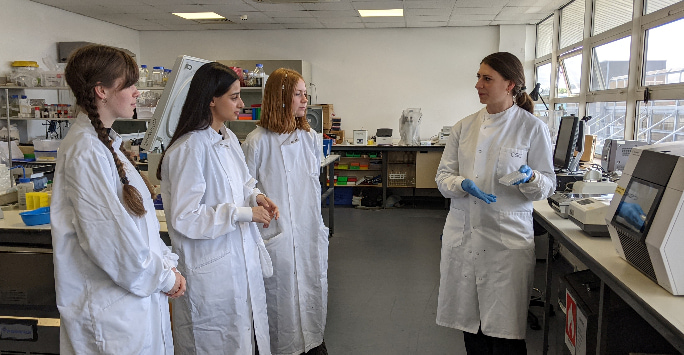
With winter coming to an end and student placements rapidly approaching, we look back to last year, when the Infection Neuroscience Lab hosted undergraduate students for a six week Summer Research Studentship.
The Infection Neuroscience Lab (INL) is based at the Clinical Sciences Centre at Aintree Hospital, working at the intersection between Neuroscience and Infection. The INL is led by Professor Benedict Michael, Professor of Neuroscience and MRC Clinician Scientist at the NIHR Health Protection Research Unit for Emerging and Zoonotic Infection and an Honorary Consultant Neurologist at The Walton Centre.
As a group, we are interested in working collectively, using our different medical specialities and skill sets, to understand the impact of infection on the brain, not just clinically, but also at an immunological, virologic, genetic, and neuroimaging level. INL is currently researching the clinical features and biological mechanisms of COVID-19 on the brain. The COVID-Clinical Neuroscience Study (COVID-CNS) has identified that even in young patients with COVID-19 strokes, potentially treatable risk factors, including hypertension and diabetes are key (Brain Comms 2021). We also identified the impact of ethnicity on CNS complications in children and adolescents (Lancet Child & Adolescent Health).
Manreen Grewal and Alexandra Roof spent six weeks in the Infection Neuroscience Lab funded by the School of Life Sciences Summer Research Studentship Scheme (organised by Professor Zenobia Lewis) and the IVES Undergraduate Summer Studentship (organised by Jackie Lee and supported by the IVES Research and Impact Committee), respectively.
You've completed two years at University of Liverpool, what degree programmes are you in?
Alexandra: Biochemistry
Manreen: Biomedical Sciences
Why did you choose to do this studentship?
Alexandra: The studentship appealed to my interest in neuroscience, and additionally provided an opportunity to increase my lab experience. I was able to learn new techniques with different pieces of equipment, and it gave me an insight into ongoing research.
Manreen: I have an interest in infectious disease and neuroscience and the studentship gave me the opportunity to work with both topics. As a result of the pandemic a lot of my course was online, so I thought it was important to get some more lab experience and learn new skills.
How was the lab studentship valuable?
Alexandra: The studentship allowed me to see the inner workings of clinical research, and to understand the complex processes which are required before publishing successful research papers. I received useful advice from a variety of professionals and developed an understanding of my likes and dislikes within this type of environment that will be very helpful in future career decisions.
Manreen: The studentship opened my eyes into the working environment of a research group. As a university student you tend to focus on your next exam or essay, whereas through the studentship I could see how all the skills I was taught on my course could be applied to clinical research and real world problems. Additionally, everyone on the studentship was so helpful and I gained a lot of advice on future career options.
What are some of the transferable skills that you have learnt?
Alexandra: The studentship ran over a short period of time, and as a result I learnt to quickly integrate myself into a team and adapt to a new environment. I also developed a greater efficiency in digital communication with its blended remote/in-person nature. I improved on my organisational skills as I had to learn large amounts of new information, as well as how to effectively record information.
Manreen: The studentship required lots of attention and concentration due to all the new information that we were learning. Therefore, I had to adapt very quickly to the workload as well as making sure I understood what was going on around me.
Was the studentship different to what you expected?
Alexandra: Before starting it seemed daunting, but everyone was much more welcoming than I could’ve hoped for. I felt it was a comfortable environment to learn in without judgement.
Manreen: I initially thought that it would be a very strict professional environment where I would be judged a lot since I was still a student and had less knowledge in the neuroscience area. However, it was the opposite and everyone was so welcoming.
Did it at all influence your career aspirations?
Alexandra: Yes, it helped me explore my interests and learn more about how theory is used in practice for investigating specific questions such as identifying the presence and concentration of cytokines in tissue. This showed me how my degree could be applied in research and whether I would enjoy this as a career option.
Manreen: Yes, it has helped in deciding my final year honours project.
Would you recommend the studentship to other students? If so, why?
Alexandra: Definitely! It was a great experience that will help in both my university degree, when working on my final year project, and in my career aspirations afterwards, as I’ll be able to make more informed decisions.
Manreen: Yes, I have learnt so many things on the studentship such as meeting new people and quickly learning to adapt to an unfamiliar environment, as well as how to make figures on R. All of these skills are ones that I’ll be able to use in the future.
Any advice for future students?
Alexandra: Don’t be afraid to ask others for an experience such as the studentship. It's a great opportunity, and if you don’t ask you could miss out on an experience that could benefit you greatly. Networking and expanding your network are a great way to open up opportunities for yourself. Tips for how to ask and apply can be found online or by visiting the Career studio.
Manreen: Apply to everything the university email you about because you never know which one you might get onto and you may end up absolutely loving it, like me!